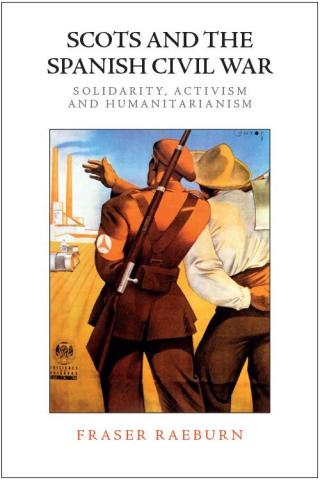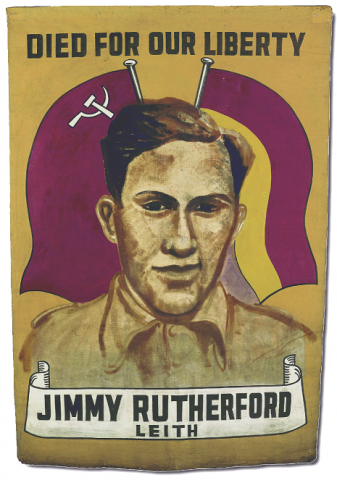International Brigade Memorial Trust
Mike Arnott, IBMT Scotland Secretary, reviews ‘Scots and the Spanish Civil War: Solidarity Activism and Humanitarianism’ by Fraser Raeburn (Edinburgh University Press, 2020). This review was originally published in ¡No Pasarán! 1-2022.
Dr Fraser Raeburn will be speaking at the IBMT’s annual Len Crome Memorial Conference 2022, on Saturday 19 March at the University of Edinburgh. Further details and tickets can be found via Eventbrite here.
Fraser Raeburn’s book is important on a number of fronts. It is the first major publication on the Scots in Spain since Dan Gray’s ‘Homage to Caledonia’ 12 years ago. He also aims to address a dearth of academic historical analysis of the subject of how Scots intervened in Spain, either by going there to fight or nurse, or via solidarity support on the ‘home front’.
More specifically, whilst even UK-focused works have noted the relatively higher proportion of Scots in the British Battalion, there has been little investigation into why. Nor into the way in which the relative strengths and politics of Scottish Labour, ILP, communism and anarchism translated into practical results and how the tensions between these actors played out.
In answering these questions, Raeburn begins with as good a snapshot of Scotland in the 1930s as you could expect to find in a book of 224 pages. The economy, society and the left are clearly and concisely sketched and help set the scene for the reader for the following chapters. It is in his well-researched analysis of the make-up of the Scottish volunteers that fresh methodology first emerges. This leads him to call for them to be regarded as a cohesive group prior to leaving Scotland, rather than a disparate group of individuals who only bonded in Spain.
More controversially, but probably justified, is his rigorous approach to the records, which makes him scale down the previously accepted number of 549 Scots to 520, with Glasgow seeing its contingent reduced from 220 to 199.

Banner made by Edinburgh East Communist Party, now held by the People’s Story Museum, remembering Edinburgh International Brigader Jimmy Rutherford.
Lack of previous detailed analysis of that city’s Brigaders make it hard for this reviewer to challenge him, although I feel in a better position to query his reduction of Dundee’s number from 60 to 57! That 56 per cent of this number were verifiable as Communist Party members is interrogated further in the next chapter on why Brigaders went and the processes involved.
Here, Raeburn posits that rather than being representative of Scotland as a whole, the volunteers were drawn from a relatively homogenous group who had both the politics and the societal connections within which to discuss the pros and cons of going to fight. This concentration amongst the Communist Party and close fellow travellers can explain why volunteer numbers went down in the second half of 1937, yet Aid for Spain activity in Scotland grew. The core of volunteers was being mined out and hadn’t been broadened successfully as a ‘popular front’ the way the Aid movement had.
Subsequent chapters look at the Scots volunteers in Spain and how they acted and interacted, the support at home, both specifically for the volunteers and also the greater Aid Spain initiatives and a treasure chest of new research into the parts played by Scotland’s wider labour and trade union movement.
A concluding epilogue gives a short summary of events after 1939, with the International Brigade Association’s development through to the play ‘549: Scots of the Spanish Civil War’, which toured the UK in 2018-2019.
The great value of this book is the magnifying glass it takes to the records of the volunteers and the broad solidarity movement and how they lie in the landscape of Scotland and the wider UK of the 1930s. It is not a popular hagiography of the volunteers. Some of it is painful reading, with descriptions and analysis of desertions and some of the political attitudes making the going tough. Neither is it the all-encompassing epic work which the subject matter undoubtedly deserves. But it is entertaining, thought- provoking and without doubt a very valuable and important addition to the body of work already available on the subject.
Posted on 3 March 2022.
